Miniature Pinschers are small dogs with big personalities. They are known for their energy, intelligence, and loyalty to their owners. However, one question that many potential owners ask is whether or not Miniature Pinschers are easy to train. The answer to this question is not a simple yes or no, as it depends on a variety of factors. Are Miniature Pinschers Easy to Train?
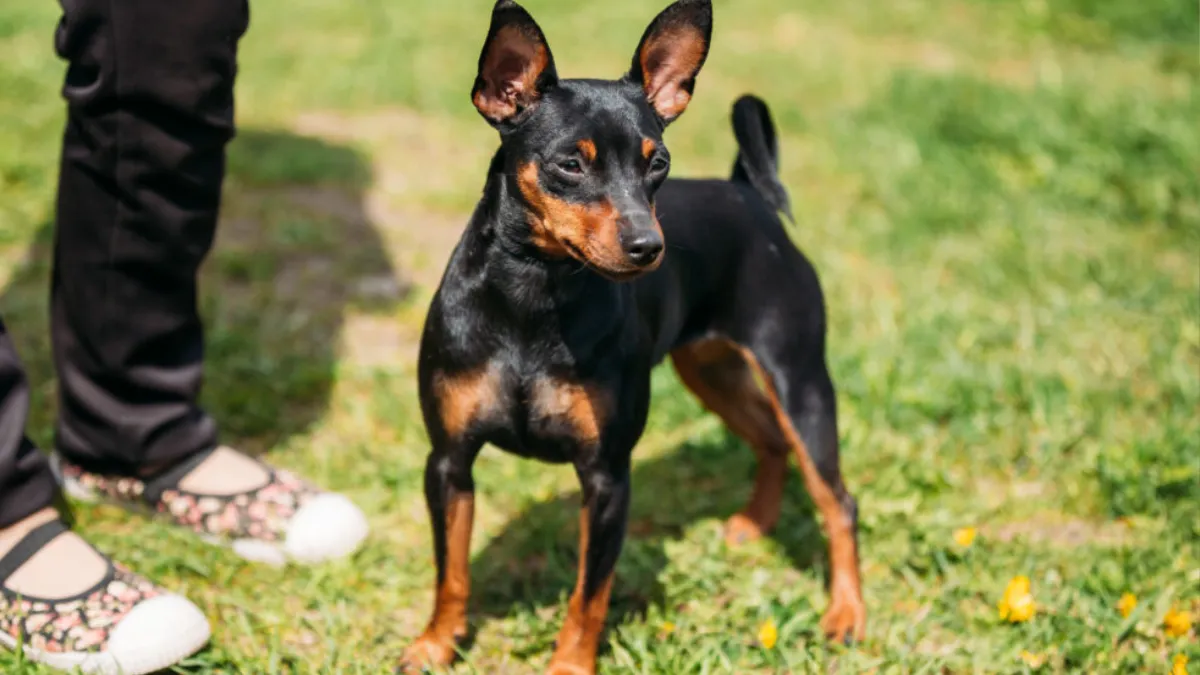
One of the key factors that can affect a Miniature Pinscher's trainability is their personality. These dogs are known for being independent and stubborn, which can make training a challenge. However, they are also highly intelligent and eager to please their owners, which can make them more receptive to training.
Additionally, socialization and proper training from a young age can help to mitigate any stubborn tendencies and make training easier.
Overall, while Miniature Pinschers may present some challenges when it comes to training, they are certainly not impossible to train. With patience, consistency, and positive reinforcement, these dogs can learn a variety of commands and behaviors. Potential owners should keep in mind that every dog is unique, and what works for one Miniature Pinscher may not work for another. However, with the right approach and plenty of love and attention, these small dogs can make wonderful companions for those willing to put in the time and effort to train them.
Understanding Miniature Pinscher Traits
Temperament and Personality
Miniature Pinschers, or Min Pins, are known for their alert, courageous, and spirited temperament. They are often described as stubborn, curious, and independent, which can make training a challenge for some owners. However, with patience and consistency, Min Pins can be trained to follow commands and behave appropriately.
One of the key traits of the Miniature Pinscher is their fearlessness. They are not easily intimidated and will stand their ground when faced with a threat. This can sometimes lead to aggression towards other dogs or strangers, so socialization is important from a young age.
Physical Characteristics
The Miniature Pinscher is a small breed, typically weighing between 8-10 pounds and standing 10-12 inches tall at the shoulder. They have a short, smooth coat that comes in a variety of colors, including black, red, and chocolate. Their ears are naturally erect and their tail is usually docked.

Despite their small size, Min Pins are muscular and athletic. They require regular exercise to maintain their physical health and mental well-being. They also have a high prey drive, so it's important to keep them on a leash or in a securely fenced area when outside.
History and Origin
The Miniature Pinscher is believed to have originated in Germany, where they were used as a ratting dog. They were first recognized by the American Kennel Club in 1925 and have since become a popular companion breed.
In conclusion, the Miniature Pinscher is a unique and spirited breed with a strong personality. While they can be challenging to train, with the right approach and consistency, they can become well-behaved and obedient companions.
Essentials of Training Miniature Pinschers
Miniature Pinschers are intelligent and energetic dogs that require proper training to become well-behaved pets. Here are some essential tips for training your Miniature Pinscher:
Starting Early
Training should begin as early as possible. Miniature Pinschers are quick learners, and starting early can help establish good habits and prevent bad ones from forming. Puppy training classes can be a great way to start training and socializing your Miniature Pinscher.
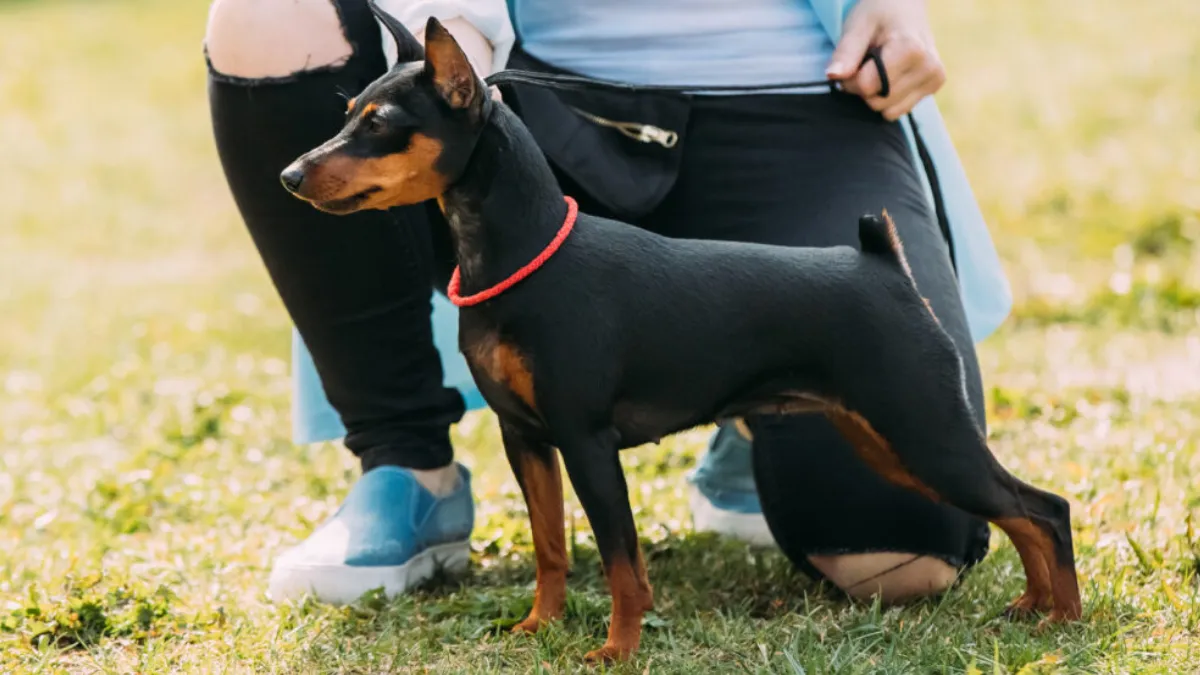
Importance of Socialization
Socialization is crucial for Miniature Pinschers. They need to learn how to interact with other dogs and people to prevent aggression and fearfulness. Socialization should start early and continue throughout their lives. Positive reinforcement techniques can be used to encourage good behavior during socialization.
Establishing Leadership
Miniature Pinschers are strong-willed and can be difficult to train if they don't see their owner as the leader. Establishing leadership through positive reinforcement and consistency can help make training easier. It's important to be firm but fair and to use positive reinforcement techniques to build trust and obedience.
Training should be a positive experience for both the owner and the Miniature Pinscher. A routine should be established for training sessions, and positive reinforcement techniques should be used to encourage good behavior. With patience and consistency, Miniature Pinschers can be trained to be well-behaved and obedient pets.
Effective Training Techniques
Positive Reinforcement Methods
Miniature Pinschers respond well to positive reinforcement methods, which involve rewarding good behavior rather than punishing bad behavior. This can include giving treats, praise, or toys when the dog follows a command correctly. It's important to use a clear and consistent reward system to help the dog understand what behavior is desired.
Obedience Training Fundamentals
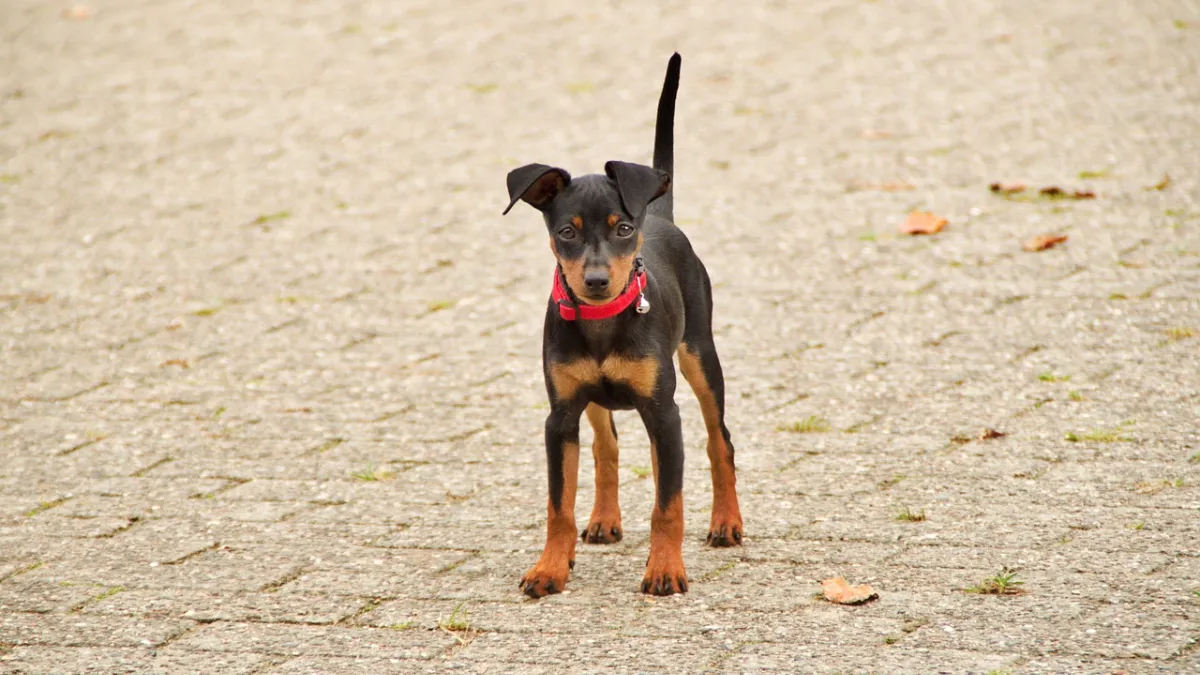
Obedience training is a crucial part of training a Miniature Pinscher. This involves teaching the dog basic commands such as sit, stay, come, and heel. It's important to use a clear and consistent command for each behavior and reward the dog when they follows the command correctly. Using treats or toys as rewards can be effective, but it's important to gradually phase out the treats as the dog becomes more proficient in following commands.
Addressing Behavioral Problems
Miniature Pinschers can be stubborn at times and may exhibit behavioral problems such as barking excessively or jumping on people. It's important to address these problems early on to prevent them from becoming ingrained habits. Professional trainers can help address these issues, but owners can also work on training techniques such as redirecting the dog's attention or teaching alternative behaviors. Consistency is key in addressing these problems, as well as using positive reinforcement methods to encourage good behavior.
Overall, training a Miniature Pinscher can be a rewarding experience with the right techniques and approach. Using positive reinforcement methods, clear commands, and addressing behavioral problems early on can help ensure a well-trained and well-behaved companion.
Common Training Challenges
Miniature Pinschers are intelligent and trainable dogs, but they can be stubborn at times. Here are some common training challenges that owners may face when training their Miniature Pinschers.
Dealing with Stubbornness
Miniature Pinschers are known for their stubbornness, which can make training difficult. To overcome this challenge, it is important to establish yourself as the pack leader and use positive reinforcement techniques. Consistency is key when training a Miniature Pinscher, and owners should be patient and persistent in their training efforts.
Preventing Excessive Barking
Miniature Pinschers are naturally vocal dogs, and excessive barking can be a problem if not addressed early on. To prevent excessive barking, owners should provide their Miniature Pinscher with plenty of exercise and mental stimulation. Teaching the "quiet" command can also help reduce barking.
Housebreaking and Potty Training
Housebreaking and potty training can be a challenge for any dog, including Miniature Pinschers. Consistency is key when housebreaking a Miniature Pinscher, and owners should establish a routine for taking their dog outside. Accidents are bound to happen, but owners should avoid punishing their dogs for accidents and instead focus on positive reinforcement for good behavior.
Overall, Miniature Pinschers can be easy to train with the right approach and patience. By addressing common training challenges, owners can help their Miniature Pinscher become a well-behaved and obedient companion.
Advanced Training and Activities
Miniature Pinschers are intelligent dogs that love to learn and be challenged. Advanced training and activities can help keep them mentally stimulated and physically fit.
Agility and Exercise
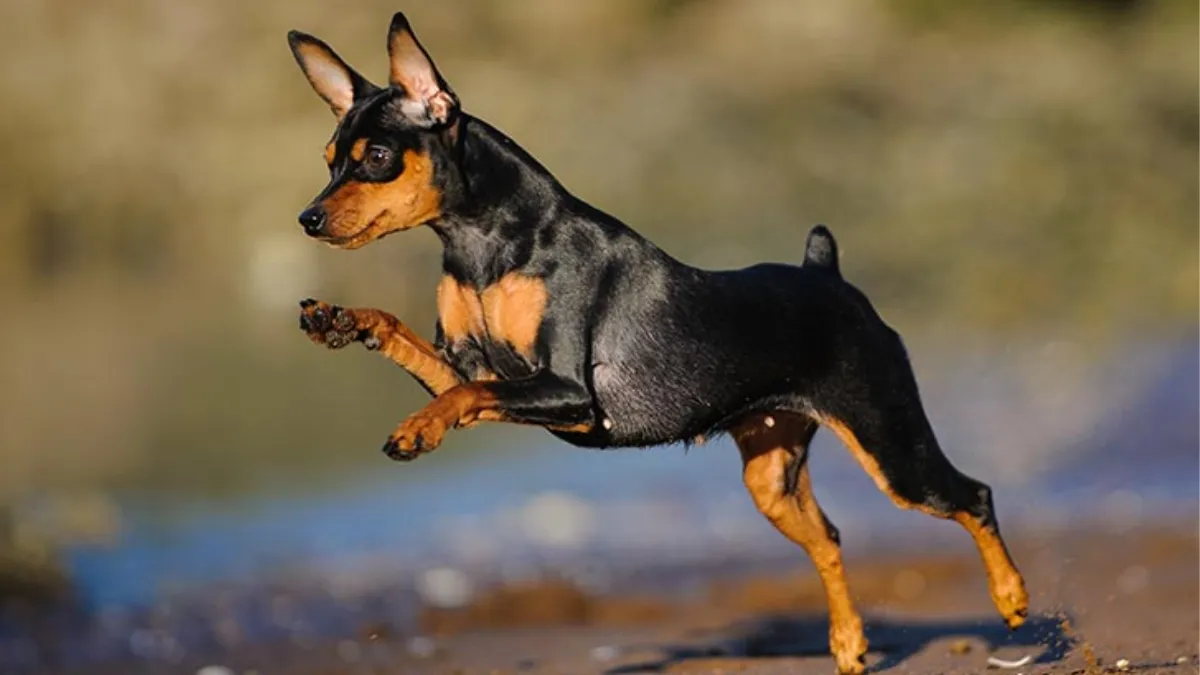
Miniature Pinschers are agile and energetic dogs that excel in agility training. Agility training involves various obstacles such as jumps, tunnels, and weave poles that the dog must navigate through as quickly as possible. It is a great way to provide both physical and mental exercise for your Miniature Pinscher.
Advanced Commands and Tricks
Miniature Pinschers are quick learners and can easily learn advanced commands and tricks. Some advanced commands that can be taught include "roll over," "play dead," and "fetch." It is important to use positive reinforcement techniques such as treats and praise to encourage good behavior.
Off-Leash Training
Off-leash training can be challenging for Miniature Pinschers as they tend to chase after small animals. However, with proper training, they can learn to stay by their owner's side and come when called. It is important to start off-leash training in a safe and secure area and gradually increase the level of distraction.
In conclusion, Miniature Pinschers are intelligent and trainable dogs that thrive on advanced training and activities. With proper training and positive reinforcement, they can learn a variety of commands and tricks and excel in agility training. It is important to provide them with both mental and physical exercise to keep them happy and healthy.
Health and Care Considerations
Nutrition and Diet
Miniature Pinschers require a well-balanced diet that includes high-quality protein, healthy fats, and essential vitamins and minerals. It is important to avoid overfeeding, as Miniature Pinschers are prone to obesity. Feeding them small, frequent meals throughout the day can help maintain their weight and prevent digestive issues. It is also recommended to avoid feeding them table scraps or human food, as it can lead to gastrointestinal problems.
Regular Health Check-Ups
Miniature Pinschers are generally healthy dogs, but they can be prone to certain health issues such as progressive retinal atrophy. Regular check-ups with a veterinarian are important to ensure their overall health and well-being. It is recommended to schedule annual check-ups that include dental exams, vaccinations, and parasite prevention.

Mental Stimulation and Comfort
Miniature Pinschers are intelligent dogs that require mental stimulation and comfort to prevent boredom and anxiety. Providing them with toys, puzzles, and interactive games can help keep them mentally stimulated. It is also important to provide them with a comfortable and safe environment, including a cozy bed and a designated space for them to rest and relax.
Overall, caring for a Miniature Pinscher requires attention to their nutrition and diet, regular health check-ups, and mental stimulation and comfort. By providing them with proper care and attention, Miniature Pinschers can live happy and healthy lives.
Choosing the Right Training Resources
Training a miniature pinscher can be a challenging task, but with the right resources, it can be a rewarding experience. Here are some tips on choosing the right training resources for your miniature pinscher.
Selecting a Dog Trainer
Choosing the right dog trainer is crucial for the success of your miniature pinscher's training. A professional dog trainer can help you train your dog safely and effectively. Look for a trainer who has experience working with miniature pinschers and uses positive reinforcement techniques.
Training Resources and Tools
There are many training resources and tools available for miniature pinscher owners. Obedience classes, dog books, and online resources can all help train your dog. When selecting training resources, make sure they are appropriate for your dog's age, breed, and temperament.
Some useful training tools for miniature pinschers include:
- Treats: Use small, soft treats as rewards during training sessions.
- Clicker: A clicker can be used to mark desired behaviors during training.
- Leash and collar: A well-fitted leash and collar are essential for training your dog to walk on a leash.
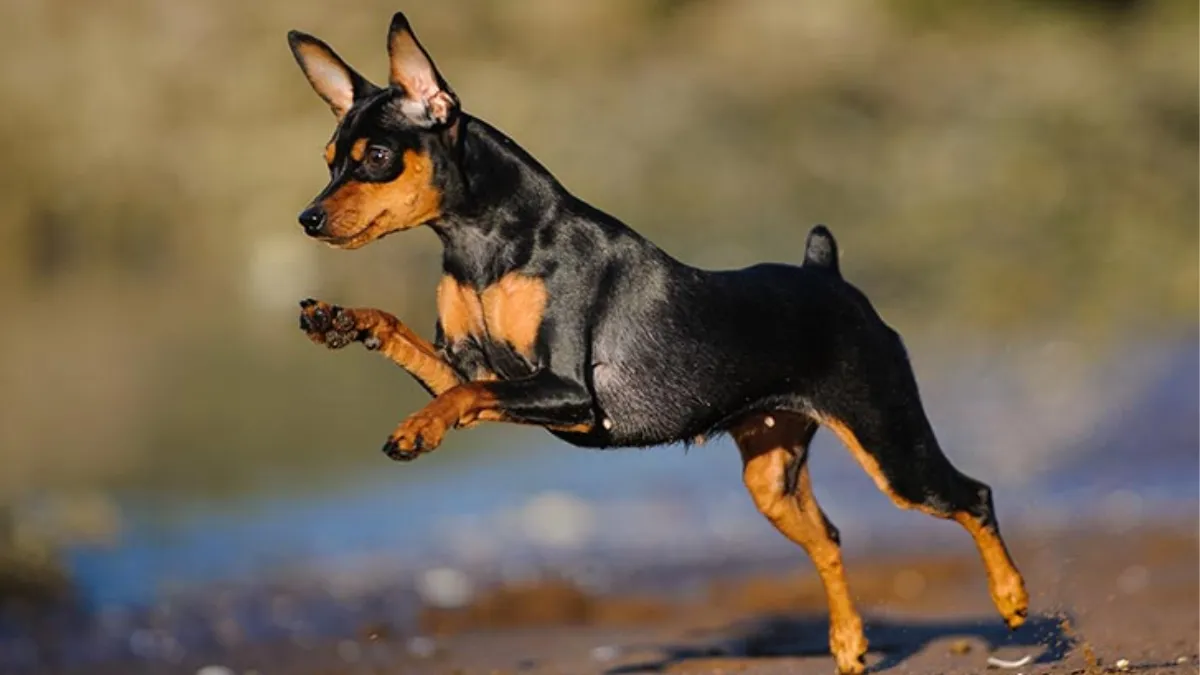
Learning from Experienced Owners
Experienced miniature pinscher owners can be a valuable resource for training tips and advice. Consider joining a breed-specific club or online forum to connect with other owners. You can also learn from reputable breeders and rescue groups.
Remember, training a miniature pinscher takes time and patience. With the right resources and a positive attitude, you can help your dog become a well-behaved and obedient companion.
Conclusion:
In conclusion, the question "Are Miniature Pinschers Easy to Train?" prompts careful consideration. While these dogs possess intelligence and a desire to please, their independent nature can present challenges in training. However, with patience, consistency, and positive reinforcement techniques, Miniature Pinschers can indeed be trained effectively.
It's essential to understand the unique traits of the Miniature Pinscher breed, including their high energy levels and strong-willed demeanor. Tailoring training methods to suit their personalities can greatly enhance success. Utilizing rewards-based training, such as treats and praise, can motivate these spirited dogs and foster a positive learning environment.
Moreover, early socialization and consistent training from a young age are vital for shaping desirable behaviors and preventing potential issues like excessive barking or aggression. Engaging in regular mental stimulation and physical exercise also helps channel their energy constructively and fosters a closer bond between owner and pet.
In essence, while Miniature Pinschers may present some training challenges, with dedication, understanding, and the right approach, they can become obedient and well-behaved companions. Remember, every dog is unique, so tailoring your training methods to suit your Miniature Pinscher's individual needs is key to success in obedience training.